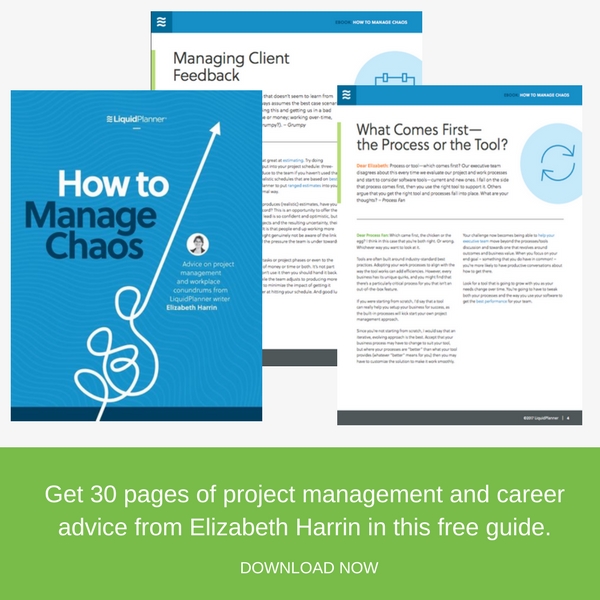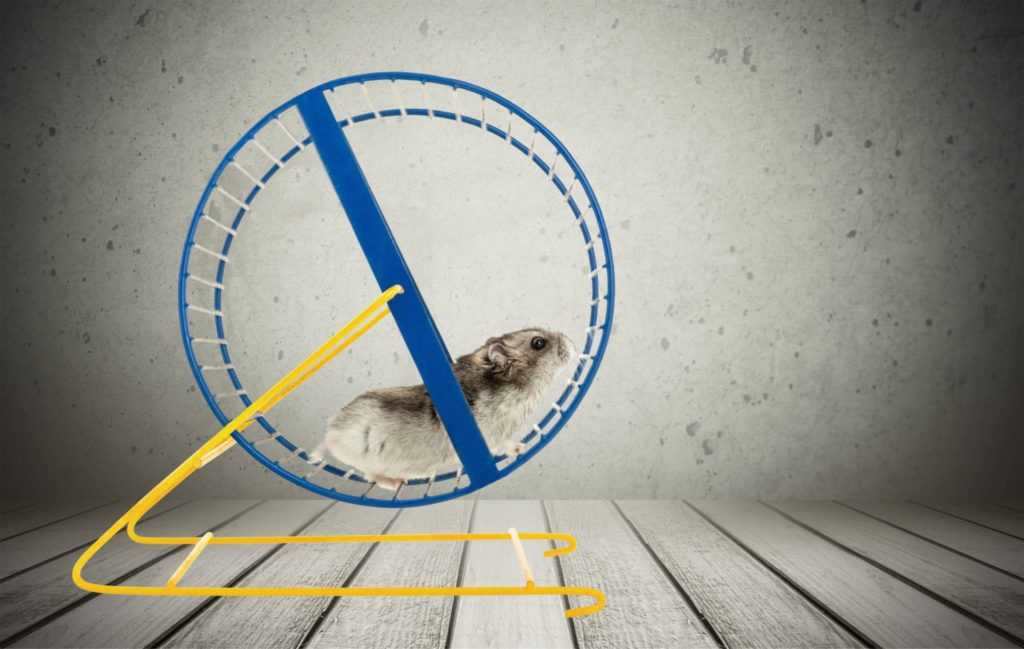“Dear Elizabeth: It feels like I’m spending so much time just staying on top of things. I have systems, but I don’t think they are the best. Otherwise, I wouldn’t feel like I’m never getting anything done. Does that make sense? How can I be more productive when working on a project or task?”
It makes perfect sense to me! I’ve certainly had times when I’ve worked really hard and had nothing to show for it at the end of the day. They weren’t productive days, and they made me feel like I wasn’t achieving anything.
I don’t know about you, but as a project manager, I don’t like to feel as if I’m not achieving anything. I get a buzz out of keeping my projects moving forward in the right direction, so unproductive days zap my motivation.
The thing is, productivity looks different for different situations. You’ve asked about being productive on a project and also on a task, and they are different beasts. Let’s break it down.
Task Productivity
It’s hard to be productive if you don’t have a clear understanding of what is required. I was doing some work recently where the briefing from the client was vague, I didn’t have access to the right files, the files I did have were the wrong versions (and they told me that).
I wasn’t productive when that job started, I can tell you. It took a while to get clarity on what was required, how they wanted me to do it, what resources I needed access to, and who was going to give them to me.
And all the while I felt bad because I wasn’t producing anything for them.
Get complete clarity on what the task is. Even if that means asking the stupid questions, or asking the questions again and again until you get the answers you need to start work.
Then, make sure you set aside enough time to actually do the work. Much ‘unproductivity’ comes about because we are too squashed for time.
When you don’t have enough time to do the task, you start to worry about the output – will it be good enough? Can I get it done? And you don’t focus on the work that you can do.
Then, do the work. This is the most important part! If it’s a long job, document where you are, track your progress, and provide updates to your manager (or do them for your own benefit) as you go along.
I wish there was some kind of magic formula for being more productive, but at the end of the day it’s all about focus. Know what you have to do, don’t lose focus, and just get on with it.
Focus, focus, focus.
Project Productivity
Productivity sustained across a whole project is a different matter. You’ve got to facilitate the work of others. Your project needs a clear definition, just like you would need for a task. You need to think about the overall structure of the work, breaking it down into component tasks.
Then you need to structure the tasks in a way that makes sense for the flow of work, ensuring that there are realistic estimates for the work required. Those tasks need to be allocated to the people who can do them best, and who agrees that it is their job to do them.
There’s nothing more unproductive than someone who feels that a task isn’t their responsibility.
Your aim is to set up your task owners for success by helping them be productive. You’re creating a foundation for them to be able to do their work with the right resources and the right inputs (hence why it’s important to have the tasks scheduled at the right time in the flow so that pre-requisite tasks are complete).
It’s a lot easier to be productive over a project or task if you enjoy the work. If you don’t enjoy what you do, you’ll find reasons not to do it, and it’s not difficult to find things that you would prefer to be spending time on!
I know it’s not realistic to love everything you have to do in the office, but the more fun you can build into your day the better it will be for you and your team members. It’s easier to get stuff done when you are hanging out with people who think about work in the same way as you do and are nice to be around.
I’m guessing your next question is: What can I use to help me do all this?
To start with, you can use your common sense to block out your time to do your work in a productive fashion. So no social media. Put your phone on silent if you need to and turn off email pop up notifications. Get into the ‘work zone’ and set yourself up for productive success.
Second, make the most of the project management tools given to you for your own personal productivity too. Track your time so that you know what you are currently spending your day on. This is incredibly important. In my experience, the most productive people know what their priorities are and work on them, without distractions. And they know how they are spending their time.
The tasks you are working on might not fit neatly within your project schedule, but you can still use enterprise project management tools to manage your personal tasks. OK, not collecting the dry cleaning. But tasks related to your work that don’t fit within a project structure, like preparing a quarterly update on the project management team’s training needs for your boss or remembering to track your monthly hours for the PMO.
With tools like LiquidPlanner, the functionality is just there: you can create new tasks, track time, and more. If you’re in a project management role, you likely have some tools that you use daily and are comfortable using. Start treating your personal To Do list like a project and track and manage it in the same way. That’s a sure way to give you clarity, keep you focused and boost productivity.








